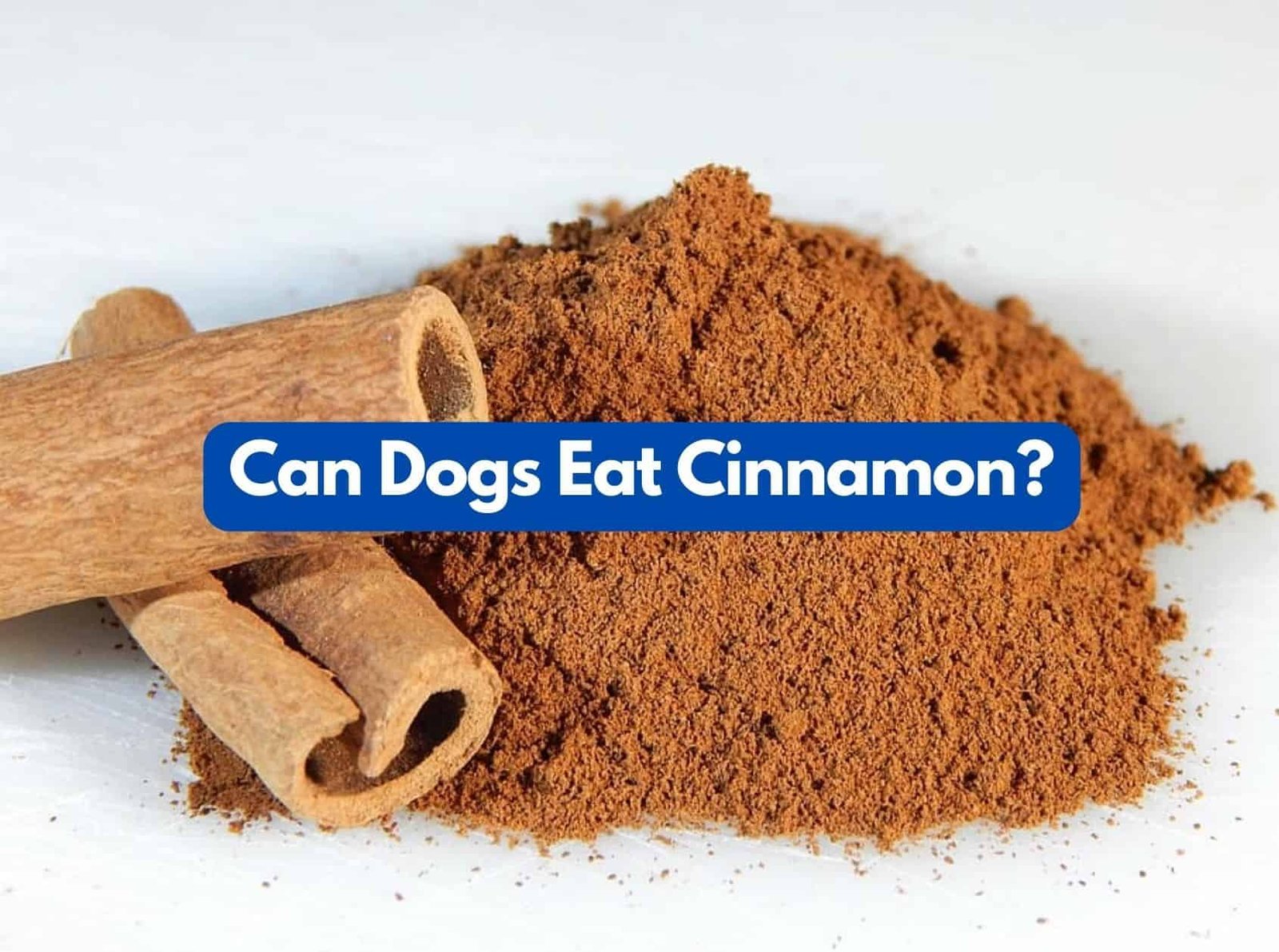Can Dogs Eat Food With Cinnamon? A Comprehensive Guide for Pet Owners

Cinnamon is a popular spice that adds flavor and aroma to many dishes and desserts. But can dogs eat food with cinnamon? Is it safe or harmful for them? If you are a dog owner who loves to share your food with your furry friend, you might want to know the answer to these questions before you give them a bite of your cinnamon bun or apple pie.
In this article, we will explore the topic of cinnamon for dogs and provide you with a comprehensive guide on what you need to know about this spice. We will cover the following points:
- What is cinnamon and what are its health benefits for humans and dogs?
- Is cinnamon toxic to dogs and what are the signs of cinnamon poisoning in dogs?
- How much cinnamon can dogs eat and what are the best ways to feed them?
- What are some foods that contain cinnamon that are safe or unsafe for dogs to eat?
- What are some alternatives to cinnamon that are dog-friendly and tasty?
By the end of this article, you will have a better understanding of whether you can share your food with cinnamon with your dog or not, and how to do it safely and responsibly.
What is Cinnamon and What Are Its Health Benefits for Humans and Dogs?
Cinnamon is a spice that comes from the bark of several species of trees belonging to the genus Cinnamomum. There are two main types of cinnamon: Ceylon cinnamon (also known as true cinnamon) and cassia cinnamon (also known as Chinese cinnamon). Ceylon cinnamon is more expensive and has a sweeter and milder flavor, while cassia cinnamon is cheaper and has a stronger and spicier flavor.
Can Dogs Eat Food With Cinnamon?
Cinnamon is not toxic to dogs and can offer some health benefits when fed in small quantities. However, cinnamon can also cause irritation, difficulty breathing, choking, vomiting, diarrhea, and liver disease if consumed in large amounts or inhaled.
You should also avoid feeding your dog cinnamon-based baked goods, as they may contain other ingredients that are harmful to dogs, such as chocolate, raisins, xylitol, or nutmeg. If your dog eats a large amount of cinnamon, you should call your veterinarian for advice.
Read also: Can Dogs Eat Yellow Squash? A Good Vegetable or Not?

What are the Health Benefits of Cinnamon for Humans?
Cinnamon has been used for centuries as a medicinal herb and a culinary ingredient. It has many health benefits for humans, such as:
- Lowering blood sugar levels and improving insulin sensitivity
- Reducing inflammation and oxidative stress
- Fighting bacterial and fungal infections
- Boosting immune system function
- Improving brain function and memory
- Enhancing digestion and metabolism
- Protecting against dental decay and bad breath
What are the Health Benefits of Cinnamon for Dogs?
But what about dogs? Can they also benefit from eating cinnamon? The answer is yes, but only in small amounts. According to the American Kennel Club (AKC), cinnamon is not toxic to dogs, cats, or horses, as long as it is fed in moderation. Some of the potential health benefits of cinnamon for dogs are:
- Improving blood circulation and preventing blood clots
- Supporting joint health and reducing arthritis pain
- Preventing diabetes and regulating blood sugar levels
- Fighting parasites and worms
- Repelling fleas and ticks
- Freshening breath and preventing dental plaque
However, these benefits have not been scientifically proven in dogs, so you should not rely on cinnamon as a substitute for veterinary care or medication. Also, keep in mind that not all dogs like the taste or smell of cinnamon, so you should always respect your dog’s preferences and avoid forcing them to eat something they don’t enjoy.
Read also: Can Dogs Eat Rawhide Chews? Is Rawhide Chews Bad For Dogs?
Is Cinnamon Toxic to Dogs?
While cinnamon is not toxic to dogs in small amounts, it can cause problems if your dogs eat them in large quantities or in certain forms. According to the Pet Poison Helpline, it takes more than one teaspoon of powdered cinnamon to cause issues for most pets. However, some dogs may be more sensitive than others, especially small breeds or puppies.
What Are the Signs of Cinnamon Poisoning in Dogs?
Some of the possible side effects of too much cinnamon for dogs are:
- Irritation of the mouth, throat, nose, eyes, or skin
- Difficulty breathing or choking due to inhaling the cinnamon powder
- Vomiting or diarrhea due to gastrointestinal upset
- Changes in heart rate or blood pressure due to stimulating effects
- Low blood sugar or hypoglycemia due to insulin-like effects
- Liver damage or failure due to coumarin content (a compound found in cassia cinnamon)
Additionally, some forms of cinnamon can be more dangerous than others for dogs. For example, cinnamon essential oil can be toxic for dogs even in small doses, as it is highly concentrated and can cause severe burns or irritation. You should never apply cinnamon oil on your dog’s skin or fur, or let them lick it from your hands or any other surface.
Another form of cinnamon that can be harmful to dogs is cinnamon-based baked goods, such as cookies, cakes, pies, or buns. These foods can contain other ingredients that are toxic to dogs, such as chocolate, raisins, xylitol, or nutmeg. Even if they don’t contain any toxic ingredients, they can still be high in fat, sugar, and calories, which can lead to obesity, diabetes, or pancreatitis in dogs.
If you suspect that your dog has eaten too much cinnamon or something that contains cinnamon, you should contact your veterinarian immediately. Depending on the amount and type of cinnamon ingested, your vet may advise you to induce vomiting, give activated charcoal, or bring your dog in for further treatment. The sooner you act, the better the chances of recovery for your dog.

How Much Cinnamon Can Dogs Eat?
As a general rule of thumb, you should only feed your dog a small amount of cinnamon, no more than a pinch or a sprinkle per day. This is equivalent to about 1/8 to 1/4 of a teaspoon for a medium-sized dog. You should also avoid feeding your dog cinnamon every day, as it can cause tolerance or sensitivity over time.
What Are the Best Ways to Feed Cinnamon to Dogs?
The best way to feed your dog cinnamon is to mix it with their food or water or to use it as a flavor enhancer for homemade dog treats. You should always use organic and pure cinnamon powder or sticks, and avoid any products that contain artificial flavors, colors, preservatives, or additives. You should also choose Ceylon cinnamon over cassia cinnamon, as it has less coumarin and is safer for dogs.
Some examples of homemade dog treats that you can make with cinnamon are:
- Apple and cinnamon oatmeal cookies
- Pumpkin and cinnamon muffins
- Banana and cinnamon peanut butter balls
- Carrot and cinnamon pupcakes
- Sweet potato and cinnamon chips
You can find many recipes online for these and other dog-friendly treats that include cinnamon as an ingredient. Just make sure to follow the instructions carefully and use the right proportions of ingredients. You should also check the nutritional information and limit the amount of treats you give your dog per day, as they can be high in calories and carbohydrates.
What Are Some Foods That Contain Cinnamon That Are Safe or Unsafe for Dogs to Eat?
As we mentioned before, some foods that contain cinnamon can be safe or unsafe for dogs to eat, depending on what else they contain. Here are some examples of common foods that have cinnamon in them and whether you can share them with your dog or not:
Some Foods That Contain Cinnamon That Are Safe For Dogs
- Cinnamon tea: Cinnamon tea can be beneficial for dogs, as it can help with digestion, circulation, and immunity. However, you should only give your dog a small amount of plain cinnamon tea, without any sugar, milk, or other additives.
- Oatmeal with cinnamon: Oatmeal with cinnamon can be a healthy breakfast for dogs, as it can provide fiber, protein, and antioxidants. However, you should only give your dog plain oatmeal with a pinch of cinnamon, without any sugar, milk, or other toppings.
Some Foods That Contain Cinnamon That Are Not Safe For Dogs
- Apple pie: Apple pie can contain nutmeg, which is toxic to dogs. It can also be high in sugar and fat, which can cause digestive issues or obesity in dogs.
- Cinnamon toast: Cinnamon toast can contain butter, which is high in fat and can cause pancreatitis in dogs. It can also contain sugar or honey, which can cause dental problems or diabetes in dogs.
- Cinnamon rolls: Cinnamon rolls can contain raisins, which are toxic to dogs. They can also contain yeast, which can cause bloating or alcohol poisoning in dogs. They are also high in sugar and fat, which can cause obesity or diabetes in dogs.
What Are Some Alternatives to Cinnamon That Are Dog-Friendly and Tasty?
If you love baking with cinnamon but worry about its effects on your furry friends, you might be wondering what are some alternatives to cinnamon that are dog-friendly and tasty.
If you want to spice up your dog’s food or treats without using cinnamon, you might be wondering what are some alternatives to cinnamon that are dog-friendly and tasty.
Fortunately, there are some other spices that you can use instead of cinnamon that are safe for dogs and can add a similar flavor to their treats. Here are some of them:
1. Ginger:
Ginger is a spice that has anti-inflammatory, anti-nausea, and anti-microbial properties. It can help with digestion, motion sickness, arthritis pain, and infections in dogs. You can add a small amount of fresh or dried ginger to your dog’s food or water, or make ginger cookies or biscuits for them. Ginger is safe for dogs and can provide a similarly warm and slightly spicy flavor to dishes. It can be used in both sweet and savory recipes.
2. Turmeric:
Turmeric is another spice that is safe for dogs and has a slightly earthy and mildly bitter taste. It can be added to recipes for flavor and is often used in golden milk or curries. Turmeric also has potential health benefits for dogs due to its anti-inflammatory properties.
3. Parsley:
Parsley is an herb that is safe for dogs and can add a fresh and slightly peppery flavor to dishes. It can be sprinkled on top of food as a garnish or incorporated into recipes. Parsley is also known for its breath-freshening properties in dogs.
4. Mint:
Mint is a refreshing herb that is generally safe for dogs. It has a cool and slightly sweet flavor and can be used in various recipes. Mint leaves can be chopped and added to salads, infused in water, or used to make homemade dog treats.
5. Basil:
Basil is another herb that is safe for dogs and has a slightly sweet and peppery taste. It can be used in recipes ranging from pasta sauces to soups. Fresh basil leaves can be torn and added to dishes or used to make pesto, which can be a flavorful addition to your dog’s meals in moderation.
Frequently Asked Questions
Can dogs eat cinnamon?
Yes, dogs can eat cinnamon in moderation. Cinnamon is generally safe for dogs when used appropriately. However, it’s important to consider the type of cinnamon and monitor your dog for any adverse reactions.
Is cinnamon toxic to dogs?
Cinnamon is not toxic to dogs when used in small amounts. However, excessive consumption can lead to digestive issues or, in rare cases, liver damage. It’s important to use cinnamon in moderation and consult with your veterinarian for specific guidance.
What type of cinnamon is safe for dogs?
Ceylon cinnamon, also known as “true cinnamon,” is considered safer for dogs due to its lower levels of coumarin, a natural compound that can be harmful in large amounts. Cassia cinnamon, on the other hand, contains higher levels of coumarin and should be used sparingly or avoided.
Can cinnamon be beneficial for dogs?
Cinnamon can offer some potential health benefits for dogs when consumed appropriately. It possesses anti-inflammatory properties and contains antioxidants that can contribute to overall cellular health. However, it’s important to note that cinnamon alone is not a cure-all and a well-balanced diet is crucial for dogs to obtain the necessary nutrients.
How should I introduce cinnamon to my dog’s diet?
When introducing cinnamon to your dog’s diet, start with small amounts and observe their reaction. Sprinkle a small quantity on their treats or consider incorporating it into homemade dog biscuits. If your dog shows any signs of discomfort or allergies, discontinue the use of cinnamon and consult your veterinarian.
Are there any risks associated with feeding dogs cinnamon?
While cinnamon is generally safe for dogs, there are a few risks to be aware of. Excessive consumption can lead to digestive issues, and individual dogs may have sensitivities or allergies to cinnamon. It’s important to use cinnamon in moderation and monitor your dog closely for any adverse reactions.
Should I consult my veterinarian before feeding my dog Cinnamon?
Yes, it’s advisable to consult with your veterinarian before introducing any new food or spice, including cinnamon, into your dog’s diet. They can provide personalized advice based on your dog’s specific needs, health conditions, and potential interactions with medications. Consulting with a professional ensures the safety and suitability of cinnamon for your dog.
Conclusion
In conclusion, dogs can eat food with cinnamon in moderation, provided certain considerations are taken into account. Cinnamon can offer potential health benefits, such as its anti-inflammatory and antioxidant properties when incorporated appropriately into a dog’s diet. However, it’s crucial to use the correct type of cinnamon, monitor for any adverse reactions, and consult with your veterinarian to ensure the safety and suitability of your specific dog.
By following these guidelines and utilizing creative ways to incorporate cinnamon, you can enhance your dog’s culinary experience while keeping their well-being in mind. Remember, a happy and healthy pup is a cherished companion for years to come.
Disclaimer: The information in this article is not intended to be a substitute for professional veterinary advice. Always consult with your veterinarian before making any changes to your dog’s diet or introducing new foods.
Read Other Dog Food Resources





